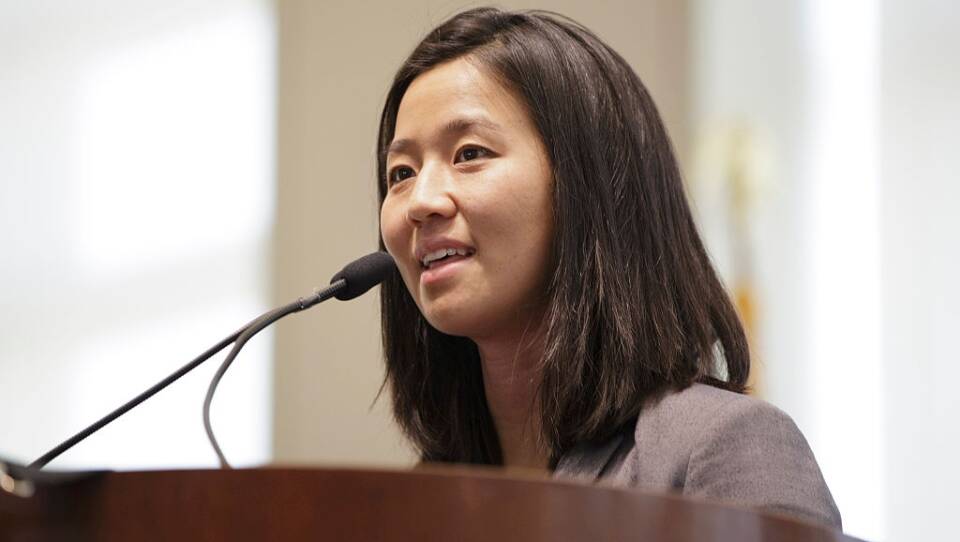As calls for the demilitarization of police departments across the country grow, the Boston City Council has voted to pass an order requiring Mayor Marty Walsh to release information about the Boston Police Department's inventory of military-grade equipment. WGBH News' Morning Edition host Joe Mathieu spoke with Councilor Michelle Wu, who introduced the order, about the action and how she hopes it can spark change. The transcript below has been edited for clarity.
Joe Mathieu: What kind of military equipment does Boston police have?
Councilor Michelle Wu: Well, that's what we're about to find out. At yesterday's Boston City Council meeting, the council voted to advance the internal 17F order, as it's technically called, that I filed. This is a request that the city charter gives to the city council — a power that the city charter gives to councilors — to request information from the mayor with a deadline of seven days. So we put forward the request for a comprehensive list of all of the equipment, whether it's military vehicles, weapons of war or ammunition that could be considered militarized, along with the tactics and training that are used and documentation of instances where this has been used in recent years.
Mathieu: So you'll start by taking an inventory here. Who would choose or deem what is militarized and who would choose which equipment should go?
Wu: We've asked for some specifics on the list, but the idea is that as Boston is part of a national conversation about public safety and what truly makes every community and every resident safe — criminal justice and how our system now is actually perpetuating racial and economic injustices — we have to be specific about what that means for our city. So we're starting with this baseline of what we currently own, what we paid to get it, and therefore how we should think about investing our resources moving forward.
Mathieu: Councilor Wu, would your order essentially repossess that equipment deemed unnecessary or would it be up to police to get rid of it?
Wu: So just to be clear, the order is first for information. We need to make sure that we have a full list of what is currently in possession by Boston police, so then we can talk about where the line should be drawn and what should be used or not used. There are some clear goals from advocates and the community. We should not rely on rubber bullets and tear gas, for example. We should not rely on tactics that verge on military and militarized aggression. And I've heard from many constituents, even in recent days, that the continued presence of military vehicles and heavily armed officers downtown does not make our city feel safer.
Mathieu: Since the protests started a couple of weeks ago, we've seen what are called mine-resistant ambush protected vehicles, armored vehicles that were designed for use in Iraq. I assume these are coming from the National Guard. So even if you demilitarize police, the National Guard can still be called in onto city streets at any time, right?
Wu: Yes. The focus is that we need to recenter our public safety and public health systems. A fundamental principle of democracy is that we keep the peace through self-governmence and not threat of military force. So whether it's in the case of events, public demonstrations or day to day interactions with residents across the city — and particularly communities of color, particularly Black Bostonians — we need to make sure that we're clear about what creates safe environments for all. And that starts from an investment in public health, making sure that people have safe [and] affordable housing, have access to food and public transportation and schools that are high quality. So there's a lot in this conversation, but we do need to make sure that Boston is specific about what we're doing, and therefore the action steps that we can take locally.
Mathieu: Councilor, let's ask you about the T while you're with us this morning. The MBTA, of course, closed a number of stations during the protests in Boston when things started to get out of hand for what the T said were safety concerns. That left a lot of people stranded. And you have introduced a resolution urging the T to remain open for peaceful assembly and for participants to get home safely.
Wu: Yes, we discussed this at yesterday's council meeting as well, and this came with some very impassioned and wise remarks from my co-sponsors on this resolution, Councilor Julia Mejia and Councilor Kenzie Bok. Many councilors expressed support for the idea that the T's sudden shut down of stations right when folks were trying to get home actually made the whole atmosphere much less safe for those who were assembled for peaceful protest. And as we're encouraging particularly our young people to exercise their rights, speak up and be part of democracy, public transportation has an important role to play in that. So we need to make sure that the T is not just focusing on their role relative to enforcing directives that may come from police or law enforcement, but really being that platform and having the ability to protect peaceful assembly and free speech.
Mathieu: Of course, the MBTA is a state run agency, and it sounds like you're also reiterating the need for a seat on the MBTA board.
Wu: That is fundamental. Our governance structure does not reflect the needs and priorities of the system. It is a transit system that is 70 percent based in the city of Boston. The city also contributes the most in terms of the out of the line item that makes up the revenues that come from assessments of local municipality, and we need to make sure that there are direct voices represented for cities, for Boston, for riders and to steer this in a direction that truly serves everyone.





